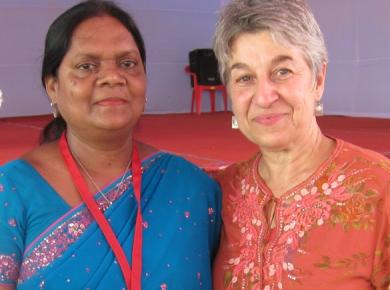Posted: May 23, 2014
United States – What began as a seminar for women in the United States has now been shared in Asia and Latin America with additional invitations received from Kenya and Trinidad.
Sister Care is a Mennonite Women USA (MW USA) sponsored program that equips women to continue their own healing journey, to identify God’s grace in their lives, and to walk with others in compassionate ways that help transform loss and grief.
The Sister Care manual was developed by Carolyn Heggen, psychotherapist and teacher, and Rhoda Keener and Ruth Lapp Guengerich, Mennonite Women USA co-directors. The manual is available in English and Spanish. About 2,500 women have attended the workshops; 500 from outside the USA.
Heggen says: “It is in great humility that we offer to share Sister Care with our international sisters. They have taught us so much about courage and perseverance, about living life with hope and dignity in the face of challenges many of us can only imagine. But we do have resources of education, of free time to create and write, of technology that many women don’t have.”
Keener adds: “MW USA has been deeply touched by the requests of our global sisters for the Sister Care leadership training resource. We invite women to take what is useful and further contextualize and reproduce it for their churches and communities.”
In the past year the Sister Care seminar has been shared in the following places: the All India Mennonite Women conference in Orissa, India; Tansen and Kathmandu, Nepal; Guatemala City; Chihuahua, Mexico; and Bogota, Colombia. A workshop is scheduled for Santa Cruz, Bolivia in November.
According to Cynthia Peacock of India, "The impact of the Sister Care workshop conducted by Rhoda and Carolyn has been tremendous. I see changes in thought, attitude and courageous steps by women to be seen as valuable creations of God, to be respected, to use their gifts, and to be treated with dignity at home and in the workplace. One example is that women are carefully, but intentionally, finding ways to share their stories of pain and hurt, wanting the church to become aware and do something. More women are looking at themselves in a new way and understand that God loves them as much as the men and wants for all a life of fulfilment and joy.”
Olga Piedrasanta of Guatemala reflected, “One of the major problems for women in the churches is their life context which includes domestic violence, poverty, and urban violence – which affects family, church, and jobs. Women need to help one another become stronger rather than to be mired in these difficulties. The Sister Care training includes skills to address how to help one another constructively as Christian sisters.”
Ofelia Garcia of Mexico and Piedrasanta received training in Guatemala to lead the workshop in Chihuahua, with women from various conferences and cultures, including Hispanic, Germanic and Tarahumara indigenous.
This workshop in Chihuahua took place five months after the assassination of pastor Josefina (Chepina) Rempening Diaz in Cuauhtémoc, Mexico, and helped to heal the pain. The sessions about loss touched the women deeply. They felt both the loss of a pastor, and the loss of their sense of security. “Since Chepina’s death I had not cried and talked like today. Thank you. It is very healing,” commented one participant.
Leaders of the Chihuahua workshop initiated a new exercise emphasizing how Jesus helped the Samaritan woman remove her mask. In groups, women responded to the questions, what is the mask I wear and what do I hide behind it? Then, one by one, each woman removed her mask and was affirmed by the other women.
This exercise was repeated in Colombia with Heggen and Elizabeth Soto Albrecht of USA facilitating. Martha Lucía Gómez and Olga Beatriz Londoño of Colombia reflected: “The dynamics of the masks helped us encounter our interior and face the reality that we often want to deny. We were challenged to heal, not camouflage pain, and to live with transparency in our lives and relationships.”
Following the workshops in Guatemala and Colombia, participants from 12 countries took 1,500 manuals home to their congregations and communities and are leading workshops. Phyllis Groff, Eastern Mennonite Missions worker in Guatemala, is translating the manual into Kekchi.
Linda Shelly, Mennonite Mission Network, assisted MW USA in collaborating with the Movement of Latin American Anabaptist Women Theologians, the hosting group for each of the Central and South American workshops. Olga Piedrasanta coordinated hosting in Guatemala, Ofelia Garcia in Mexico, Alix Lozano in Colombia, and Lizette Miranda is planning for Bolivia. Manjula Raul chaired the hosting committee in India; in Nepal the seminars were coordinated by Tansen Mission Hospital and United Mission to Nepal. MW USA’s expenses were funded by designated gifts and grants.
Ideas, energy, and love have flowed from country to country. Heggen says: “As we share and learn together we know it strengthens us all.”
Mennonite Women USA

Join the Conversation on Social Media
FacebookTwitterInstagramFlickrYouTube